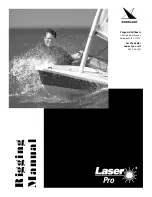
09
10
ConTRol sysTem and lInes
Before your first assembly, it is important that you take time to learn some of the
features in your new Blade Kite and prepare the kite for future launchings.
CheCKInG lIne lenGThs
All bars come assembled with lines and pass thorough quality control; however, it
is important to make sure all lines are at equal lengths before your first launch and
every few launches thereafter.
• Lay out your control bar and lines, make sure that the lines are not
tangled or crossed.
• Take a small rod and attach all four lines to the rod (see figure
on opposite page).
• With the depower strap fully released, grab the control bar.
•
Having a partner holding the rod taut, stand directly in line with the rod
and pull on the control bar with even force on both sides, straightening
the lines. Make sure that the bar is parallel with your shoulders.
• If the bar stays parallel with your shoulders when all four lines are in even
tension and the swivel dome is not more than 2 inches (5cm) from control bar, the
kite is ready for inflation.
• If the tension is not even in all four lines and the bar is tilted
in even the
slightest bit, the lines need to be adjusted.
• Do not adjust the Flying Lines! Make the lines shorter by making knots in the
Leading Lines only.
WInd RanGe
The following chart is an approximate kite size vs. wind strength reference for a
kiter weighing 75 kg on a 132cm x 41cm Sanchez board. Actual use may vary with
body weight, ability level, board size, and water conditions.
Use these numbers only as a recommendation.
TRIGGeR
size Wind (knots) beginner Intermediate/expert
5
20-35+
18-35+
7
18-35
17-35+
9
16-30
15-32
10
15-28
13-30
12
13-25
11-24
14
11-20
10-22
pRIme
size Wind (knots) beginner Intermediate/expert
7
N/A
17-31
9
N/A
15-28
11
N/A
13-25
13
N/A
11-22
faT lady
size Wind (knots) beginner Intermediate/expert
17
8-15
8-25
note: This does not guarantee a perfectly tuned kite for all kiters and
conditions. finer adjustments can be made depending on each kiter’s
preferences (see Tuning).
Summary of Contents for 2013 LADY FAT
Page 1: ... BLADEKITEBOARDING USER MANUAL 2013 ...
Page 19: ......





































